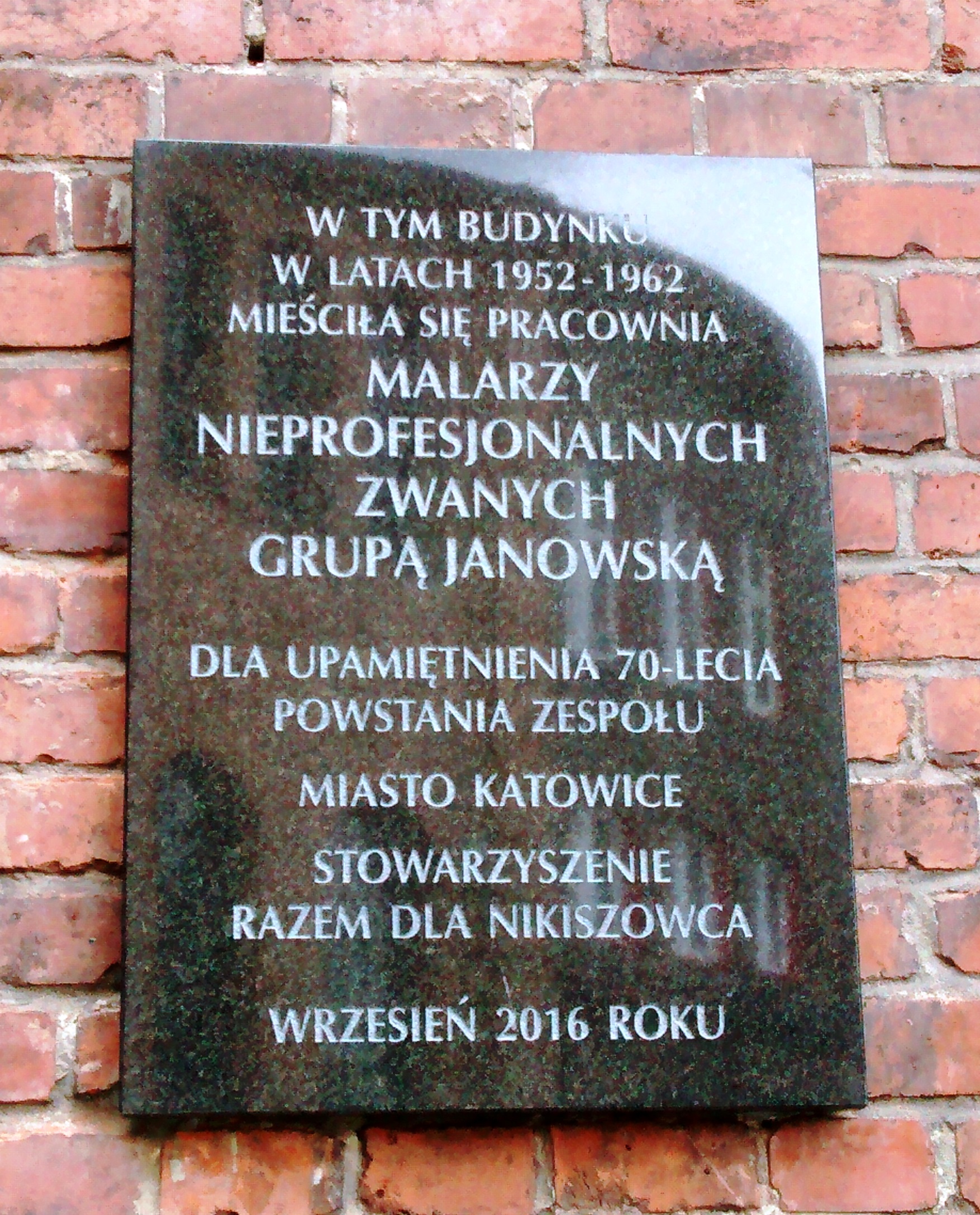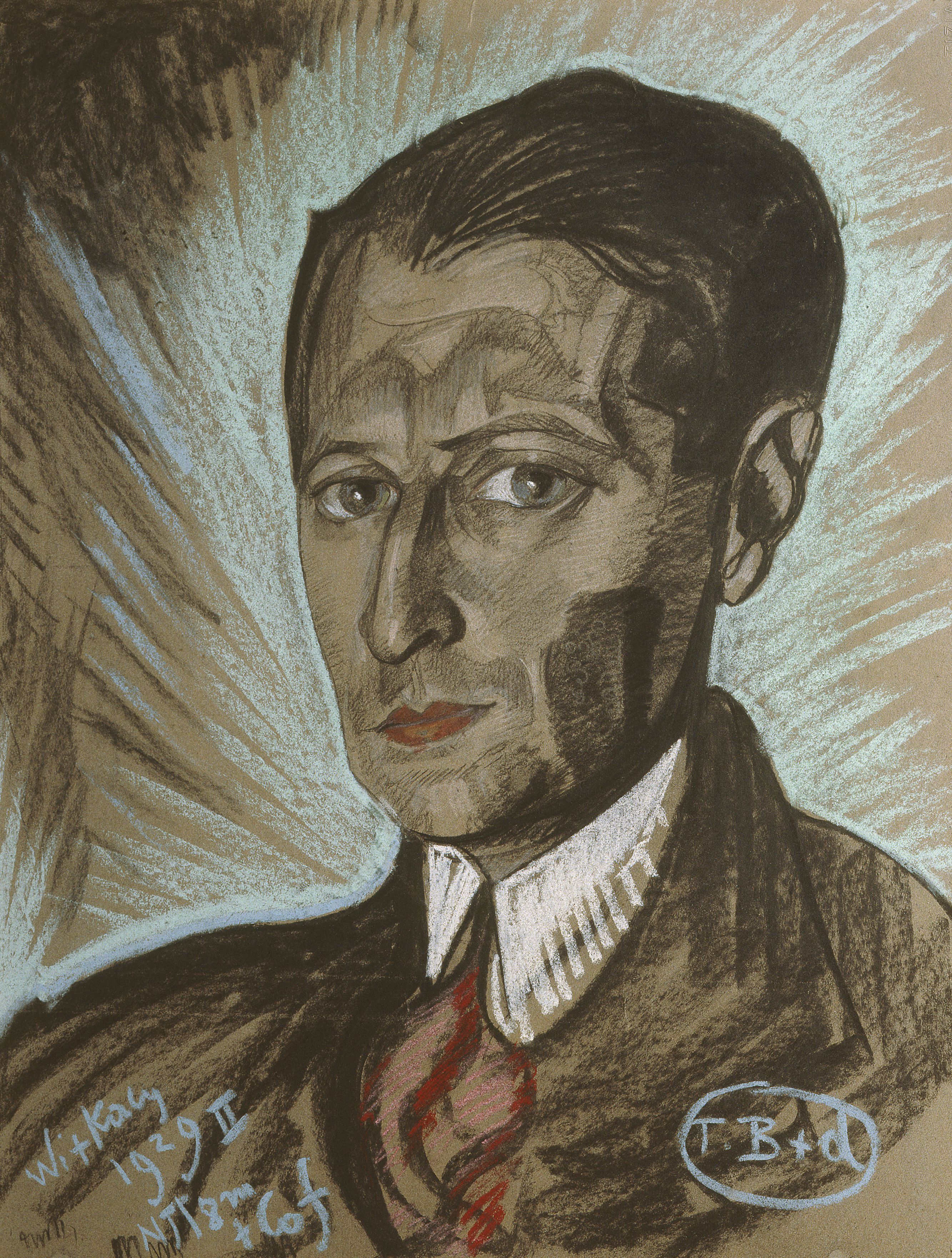|
Teofil Ociepka
Teofil Ociepka (22 April 1891 in Janów-Nikiszowiec, Janów Śląski – 15 January 1978 in Bydgoszcz) was a Polish self-taught Primitivism, primitivist painter and Theosophy (Blavatskian), Theosophist. Along with Nikifor, he was one of the best-known Polish primitivists. Early life Ociepka started working at the age of 15, so as to financially support his family after his father's death. He took on a series of jobs, eventually becoming a power plant machinist at the Giesche coal mine in Katowice, where he worked until his retirement. He served as a soldier in the German Army (German Empire), German Army during the World War I, First World War, and was introduced to occultism during that time, including through Athanasius Kircher's Oedipus Aegyptiacus, treatise on the Seventy Two Names of God. On the recommendation of his Swiss mentor, Philip Hohmann of Wittenberg, with whom he maintained steady correspondence, Ociepka became a member of the Rosicrucianism, Rosicrucian Lodge and a ... [...More Info...] [...Related Items...] OR: [Wikipedia] [Google] [Baidu] |
Janów-Nikiszowiec
Janów-Nikiszowiec (german: Janow-Nickischschacht) is a district of Katowice. It has an area of 8.65 km2 and in 2007 had 11,496 inhabitants. The district encompasses the former Janów and Nikiszowiec Nikiszowiec ( German: ''Nikischschacht'') a part of an administrative district Janów-Nikiszowiec of Katowice city. History Initially it was coal miners' settlement of Giesche mine built on the land of Gieschewald manor (Giszowiec) between 1908 .... File:Kościół św. Anny, Janów-Nikiszowiec e2.jpg, Saint Anne church in Janów File:Poczta Nikiszowiec Plac Wyzwolenia Katowice.jpg, Post office in Nikiszowiec References Districts of Katowice {{Silesian-geo-stub ... [...More Info...] [...Related Items...] OR: [Wikipedia] [Google] [Baidu] |
Lviv
Lviv ( uk, Львів) is the largest city in western Ukraine, and the seventh-largest in Ukraine, with a population of . It serves as the administrative centre of Lviv Oblast and Lviv Raion, and is one of the main cultural centres of Ukraine. It was named in honour of Leo, the eldest son of Daniel, King of Ruthenia. Lviv emerged as the centre of the historical regions of Red Ruthenia and Galicia in the 14th century, superseding Halych, Chełm, Belz and Przemyśl. It was the capital of the Kingdom of Galicia–Volhynia from 1272 to 1349, when it was conquered by King Casimir III the Great of Poland. From 1434, it was the regional capital of the Ruthenian Voivodeship in the Kingdom of Poland. In 1772, after the First Partition of Poland, the city became the capital of the Habsburg Kingdom of Galicia and Lodomeria. In 1918, for a short time, it was the capital of the West Ukrainian People's Republic. Between the wars, the city was the centre of the Lwów Voivodeship in th ... [...More Info...] [...Related Items...] OR: [Wikipedia] [Google] [Baidu] |
1978 Deaths
Events January * January 1 – Air India Flight 855, a Boeing 747 passenger jet, crashes off the coast of Bombay, killing 213. * January 5 – Bülent Ecevit, of Republican People's Party, CHP, forms the new government of Turkey (42nd government). * January 6 – The Holy Crown of Hungary (also known as Stephen of Hungary Crown) is returned to Hungary from the United States, where it was held since World War II. * January 10 – Pedro Joaquín Chamorro Cardenal, a critic of the Nicaraguan government, is assassinated; riots erupt against Anastasio Somoza Debayle, Somoza's government. * January 18 – The European Court of Human Rights finds the British government guilty of mistreating prisoners in Northern Ireland, but not guilty of torture. * January 22 – Ethiopia declares the ambassador of West Germany ''persona non grata''. * January 24 ** Soviet Union, Soviet satellite Kosmos 954 burns up in Earth's atmosphere, scattering debris over Canada's Northwest Territories. ** ... [...More Info...] [...Related Items...] OR: [Wikipedia] [Google] [Baidu] |
1891 Births
Events January–March * January 1 ** Paying of old age pensions begins in Germany. ** A strike of 500 Hungarian steel workers occurs; 3,000 men are out of work as a consequence. **Germany takes formal possession of its new African territories. * January 2 – A. L. Drummond of New York is appointed Chief of the Treasury Secret Service. * January 4 – The Earl of Zetland issues a declaration regarding the famine in the western counties of Ireland. * January 5 **The Australian shearers' strike, that leads indirectly to the foundation of the Australian Labor Party, begins. **A fight between the United States and Indians breaks out near Pine Ridge agency. ** Henry B. Brown, of Michigan, is sworn in as an Associate Justice of the Supreme Court. **A fight between railway strikers and police breaks out at Motherwell, Scotland. * January 6 – Encounters continue, between strikers and the authorities at Glasgow. * January 7 ** General Miles' force ... [...More Info...] [...Related Items...] OR: [Wikipedia] [Google] [Baidu] |
Materialism
Materialism is a form of philosophical monism which holds matter to be the fundamental substance in nature, and all things, including mental states and consciousness, are results of material interactions. According to philosophical materialism, mind and consciousness are by-products or epiphenomena of material processes (such as the biochemistry of the human brain and nervous system), without which they cannot exist. This concept directly contrasts with idealism, where mind and consciousness are first-order realities to which matter is dependent while material interactions are secondary. Materialism is closely related to physicalism—the view that all that exists is ultimately physical. Philosophical physicalism has evolved from materialism with the theories of the physical sciences to incorporate more sophisticated notions of physicality than mere ordinary matter (e.g. spacetime, physical energies and forces, and dark matter). Thus, the term ''physicalism'' is preferred ... [...More Info...] [...Related Items...] OR: [Wikipedia] [Google] [Baidu] |
Moral Absolutism
Moral absolutism is an ethical view that some (potentially all) actions are intrinsically right or wrong. Stealing, for instance, might be considered to be always immoral, even if done for the well-being of others (e.g., stealing food to feed a starving family), and even if it does in the end promote such a good. Moral absolutism stands in contrast to other categories of normative ethical theories such as consequentialism, which holds that the morality (in the wide sense) of an act depends on the consequences or the context of the act. Comparison with other ethical theories Moral absolutism is not the same as moral universalism. Universalism holds merely that what is right or wrong is independent of custom or opinion (as opposed to moral relativism), but not necessarily that what is right or wrong is independent of context or consequences (as in absolutism). Moral universalism is compatible with moral absolutism, but also positions such as consequentialism. Louis Pojman gives th ... [...More Info...] [...Related Items...] OR: [Wikipedia] [Google] [Baidu] |
Socialist Realism In Poland
Socialist realism in Poland ( pl, socrealizm) was a socio-political and aesthetic doctrine enforced by the pro-Soviet communist government in the process of Stalinization of the post-war Polish People’s Republic. The official policy was introduced in 1949 by a decree of the Polish United Workers' Party minister (later, Minister of Culture and Art) Włodzimierz Sokorski. As in all Soviet-dominated Eastern Bloc countries, Socialist realism became the main instrument of political control in the building of totalitarianism in Poland. However, the trend never became truly dominant. Following Stalin's death on March 5, 1953, and the subsequent De-Stalinization of all People's Republics, Polish artists, writers and architects started abandoning it around 1955. The De-Stalinization process peaked during the Polish October. History The policy was enforced in Poland between 1949 and 1956 amidst the wave of human rights abuses committed by the Ministry of Public Security (secret police ... [...More Info...] [...Related Items...] OR: [Wikipedia] [Google] [Baidu] |
Polish People's Republic
The Polish People's Republic ( pl, Polska Rzeczpospolita Ludowa, PRL) was a country in Central Europe that existed from 1947 to 1989 as the predecessor of the modern Republic of Poland. With a population of approximately 37.9 million near the end of its existence, it was the second-most populous communist and Eastern Bloc country in Europe. It was also one of the main signatories of the Warsaw Pact alliance. The largest city and official capital since 1947 was Warsaw, followed by the industrial city of Łódź and cultural city of Kraków. The country was bordered by the Baltic Sea to the north, the Soviet Union to the east, Czechoslovakia to the south, and East Germany to the west. The Polish People's Republic was a socialist one-party state, with a unitary Marxist–Leninist government headed by the Polish United Workers' Party (PZPR). The country's official name was the "Republic of Poland" (') between 1947 and 1952 in accordance with the transitional Small Constitutio ... [...More Info...] [...Related Items...] OR: [Wikipedia] [Google] [Baidu] |
Jan Kott
Jan Kott (October 27, 1914 – December 22, 2001) was a Polish political activist, critic and theoretician of the theatre. A leading proponent of Stalinism in Poland for nearly a decade after the Soviet takeover, Kott renounced his Communist Party membership in 1957 following the anti-Stalinist Polish October of 1956. He defected to the United States in 1965. He is regarded as having considerable influence upon Western productions of Shakespeare in the second half of the 20th century. Life Born in Warsaw in 1914 to a Jewish family, Kott was baptized into the Catholic Church at the age of five. He became a communist in the 1930s, and took part in the defense of Warsaw. In June 1939 he married Lidia Steinhaus, the daughter of the mathematician and educator Hugo Steinhaus. In September 1939, Kott fought in the Polish army in its futile campaign against the German invasion and then, after a period in Lvov, returned to Nazi-occupied Warsaw. After World War II he became known ... [...More Info...] [...Related Items...] OR: [Wikipedia] [Google] [Baidu] |
Julian Tuwim
Julian Tuwim (13 September 1894 – 27 December 1953), known also under the pseudonym "Oldlen" as a lyricist, was a Polish poet, born in Łódź, then part of the Russian Partition. He was educated in Łódź and in Warsaw where he studied law and philosophy at Warsaw University. After Poland's return to independence in 1918, Tuwim co-founded the Skamander group of experimental poets with Antoni Słonimski and Jarosław Iwaszkiewicz. He was a major figure in Polish literature, admired also for his contribution to children's literature. He was a recipient of the prestigious Golden Laurel of the Polish Academy of Literature in 1935.Julian Tuwim (1894-1953) ''Qlturka.pl.'' Europejski Fundusz Rozwoju Regionalnego. Retrieved December 12, 2011. Life and work Tuwim was born into a ...[...More Info...] [...Related Items...] OR: [Wikipedia] [Google] [Baidu] |
Henri Rousseau
Henri Julien Félix Rousseau (; 21 May 1844 – 2 September 1910) at the Guggenheim was a French post-impressionist painter in the Naïve or Primitive manner. He was also known as Le Douanier (the customs officer), a humorous description of his occupation as a toll and tax collector. He started painting seriously in his early forties; by age ... [...More Info...] [...Related Items...] OR: [Wikipedia] [Google] [Baidu] |







